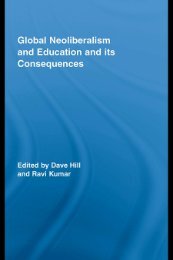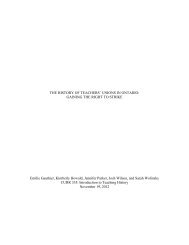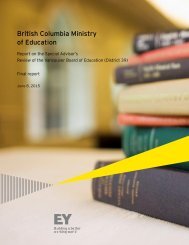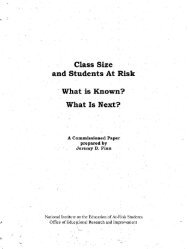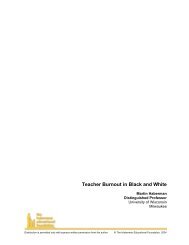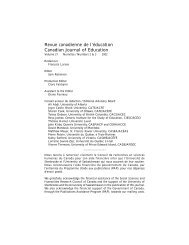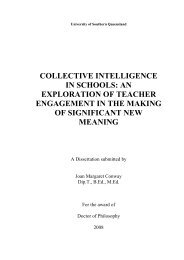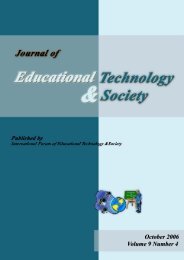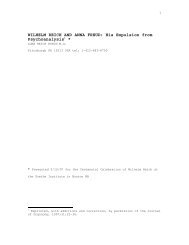Student Engagement: What do we know and what should we do?
Student Engagement: What do we know and what should we do?
Student Engagement: What do we know and what should we do?
You also want an ePaper? Increase the reach of your titles
YUMPU automatically turns print PDFs into web optimized ePapers that Google loves.
for self-directed, deep learning. The National Research Council’s statement below<br />
includes all previous purposes for increasing student engagement – achievement,<br />
belonging, equity – but also points to the “new” purpose: to enhance all “students’<br />
motivation to learn. It hints at <strong>what</strong> was yet to come – the subtle request for a<br />
relinquishing of control over curricular content, or more accurately, to allow students to<br />
choose the process <strong>and</strong> sometimes topics of learning as a way to keep students engaged in<br />
their learning.<br />
The 2004 National Research Council report on fostering high school<br />
students’ motivation to learn argued that motivation is a key factor in the<br />
success or failure of education <strong>and</strong> that “by the time many students enter<br />
high school, disengagement from course work <strong>and</strong> serious study is<br />
common.” The consequences of this disengagement are often much more<br />
serious for young people from disadvantaged backgrounds because they <strong>do</strong><br />
not usually get a second chance; students from more privileged backgrounds<br />
frequently <strong>do</strong>. The primary ingredients that foster involvement <strong>and</strong><br />
motivation to learn are “competence <strong>and</strong> control, beliefs about the value of<br />
education, <strong>and</strong> a sense of belonging” (National Research Council, 2004, p.<br />
ix) as cited in Ramaley & Zia, 2005, p. 8.2 (italics are added for emphasis)<br />
In the literature from 2005 onward, questions arose that challenged the effectiveness of<br />
prior pedagogy <strong>and</strong> curriculum in adequately preparing our youth for their careers <strong>and</strong><br />
lives. The term “Knowledge Society” or “Information Age” became popular <strong>and</strong><br />
educators no longer assumed the modernist values of an Industrial Age; instead, they<br />
moved towards a new world <strong>and</strong> a new way of being. Obviously, this movement was<br />
encouraged by a massive grounds<strong>we</strong>ll of accessible technology <strong>and</strong> information, which<br />
allo<strong>we</strong>d further opportunities to revise learning <strong>and</strong> education accordingly. As Gilbert<br />
(2007) says, the new definition of <strong>know</strong>ledge differs “from traditional philosophical<br />
underst<strong>and</strong>ings of <strong>know</strong>ledge, <strong>and</strong> because of this, it is a major challenge to our education<br />
systems. We cannot address this challenge by adding new ideas to – or tinkering with –<br />
existing structures. To address it <strong>we</strong> need to think differently about schools. We need to<br />
go ‘back to basics,’ to re-think many of our current ideas about schools, their purposes,<br />
<strong>and</strong> the best ways of achieving those purposes” (Gilbert, 2007, p. 4).<br />
Inherent in this discussion is the additional shift in locus of control over learning – from<br />
teacher controlled to student controlled. Authors such as Gilbert (2007) <strong>and</strong> Bopry &<br />
Hedberg (2005) asked if our applications of engagement models, as the word engagement<br />
implies, really allo<strong>we</strong>d students to gain “competence” <strong>and</strong> a sense of “control” over their<br />
own learning? Were they empo<strong>we</strong>red <strong>and</strong> supported to become more committed to, in<br />
love with, <strong>and</strong> willing to persevere through the challenges of learning for learning’s sake?<br />
Were students able to critique <strong>and</strong> create their own <strong>know</strong>ledge? Did their learning<br />
climates <strong>and</strong> environments support the growth of their innate interest in learning? Or<br />
<strong>we</strong>re <strong>we</strong> just t<strong>we</strong>aking an old system without actually relinquishing the control <strong>and</strong> locus<br />
of po<strong>we</strong>r to the learner?<br />
<strong>Student</strong> <strong>Engagement</strong>: <strong>What</strong> <strong>do</strong> <strong>we</strong> <strong>know</strong> <strong>and</strong> <strong>what</strong> <strong>should</strong> <strong>we</strong> <strong>do</strong>? 13



